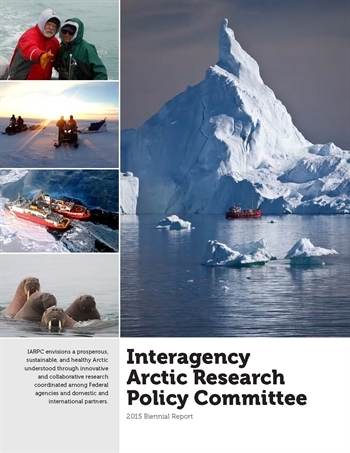By: Tamara Dickinson, Ph.D. Principal Assistant Director for Environment and Energy Office of Science and Technology Policy Executive Office of the President; Mike Kuperberg, Ph.D. Executive Director, U.S. Global Change Research Program Office of Science and Technology Policy Executive Office of the President; Sandy Starkweather, Implementation Scientist, IARPC

In December 2015, the National Science and Technology Council (NSTC) Committee on Environment, Natural Resources, and Sustainability released the Biennial Report of the Interagency Arctic Research Policy Committee (IARPC). The report covers Arctic research activities carried out by 16 Federal agencies under the IARPC 5-Year Arctic Research Plan issued by the White House in February 2013. An excerpt from a White House blog post written by Tamara Dickinson and Mike Kuperberg at the time of the Biennial Report's release is provided below, followed by information about the process by which IARPC will update the current 5-Year plan.
IARPC Biennial Report
The Biennial Report, produced by IARPC, describes key interagency activities and accomplishments carried out over a two-year period following the release of the research plan. These efforts focused on leveraging research funding and scientific talent to accelerate our understanding of, and ability to predict, environmental changes in the Arctic. The report details how IARPC enhanced cooperation among the agencies and encouraged participation from other entities, including the State of Alaska, indigenous communities, universities, local organizations, and international research agencies.
In developing its report, IARPC focused on topics considered both important to national policy and likely to benefit from interagency collaboration; these include, regional climate models, human health studies, and adaptation tools for communities.
The report describes how IARPC-enabled activities have addressed research ranging from coordinated field deployments to sharing and interoperability of data. These activities generate knowledge that will inform key national priorities such as homeland security; energy, water, and food security; maintenance of transportation infrastructure; and protection of natural resources.
For example, IARPC agencies and external partners developed a framework for studying the ecosystem in the Beaufort and Chukchi seas north of Alaska, and then, through a competitive process, selected research projects to target critical knowledge gaps. One of the most biologically diverse and productive regions in the world, this vast area is important to tribal, Alaskan, U.S., and international interests—and it is undergoing rapid change. IARPC-led efforts in this region will help leaders, decision makers, and stakeholders anticipate and effectively respond to these changes.
This and other research described in the report supports IARPC's vision of a prosperous, sustainable, and healthy Arctic understood through innovative and collaborative research coordinated among Federal agencies and domestic and international partners. It further reflects an emerging connectivity across the vast network of activities and individuals with a stake in Arctic research—a network that includes citizens of the United States, as well as many around the world.
IARPC's Update Process
The Biennial Report is a key input towards producing IARPC's next 5-year plan for Arctic research—a plan that will cover Federal activities that will benefit from interagency coordination for fiscal years 2018-2021. The plan "update" process is already well underway, guided by a subgroup of IARPC staff. Additional inputs to the new plan include agency specific plans for Arctic research, key documents describing the research needs of the State of Alaska, as well as community-produced reports on research recommendations. The next plan will build on the successes of IARPC's current implementation structure, create stronger opportunities to understand the Arctic as a system, and include even broader collaboration across Federal agencies and with non-Federal partners on important Arctic research.
A series of opportunities to solicit public input are already underway. The first was a workshop hosted in Washington D.C. on 1-2 December 2015 to clarify the high level policy drivers for the next Plan as well as to identify research themes. Regular dialog with the community about the "update" process is being sustained through IARPC Collaborations and its 12 Collaboration Teams. IARPC Collaborations membership is open to anyone who can contribute to our efforts to accelerate Arctic research, request an account at the IARPC Collaborations website. In addition, several listening sessions on the plan scope are being conducted throughout the spring. The first will be a session in Fairbanks, Alaska on 13 March 2016 as part of Arctic Science Summit Week (ASSW2016). IARPC expects that the updated plan will be ready for public comment through the Federal Register process in summer of 2016. Watch for updates on the draft release through the IARPC Collaborations website.
